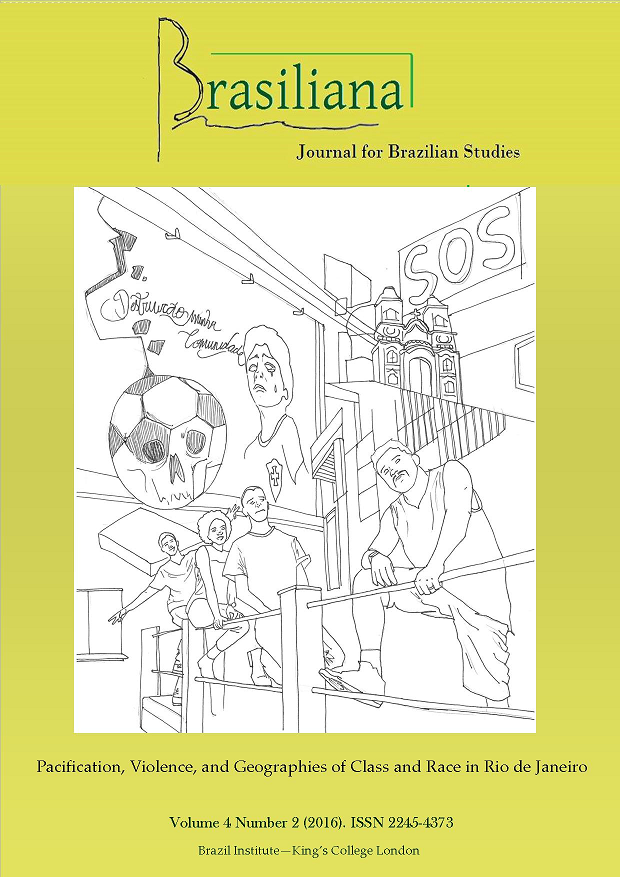Deconstructing automatisms: Milicia practices and neopentescostal formations in Rio de Janeiro
Main Article Content
Abstract
The 2012 elections for governor in Rio de Janeiro gather special attention from national and international media analysts. The city politics was under scrutiny with the mega events hosted Brazil, like the Summer Olympic Games and the Soccer World Cup. In this sense, the strategies of the candidates for the organization of the city - mainly for public safety issues - were dissected and analysed for months leading up to the election day.
In this context, as the disputes were being centralized in the candidates best placed in the pools, Luis Carlos Pezão (PMDB) and Marcelo Crivela (PRB), talks about the supposed contenders’ governance mechanisms began to be galvanized. In the mainstream narrative, the first one would gather support, along other segments, from the “milícias”, parastatal organizations that uses extortion of some communities to gather control of entire neighbourhoods. The ‘milícias’ would be one of the greatest contemporary security issues of Rio, accused of violent actions and recurrent cases of murders and violence. In turn, Crivela would be mainly supported by the neo-Pentecostal religious groups (The Guardian, 2012; O Globo, 2012). This binary narrative, reinforced by accusations from both politicians in televised debates, strengthened the discourse of an ‘ militia assault’ against the State, building the image that evangelical sectors could serve as an opposition movement to these groups. Both would operate on a complete and antagonic mechanism of governance and social organization.
The objective of this paper is to critically deconstruct these two premises. First, through a genealogical analysis of milícias groups in Rio de Janeiro, we will establish a reflection that these agents never behaved as "parallel states", as often described. Far from "invading the State,"
such actors establish enmeshment processes with government sectors, redefining practices and legitimacy in a complex system - involving elections and political support. We support this discourse with the concept of "parastatal" (Amar, 2014) to better represent these agents, believing that these considerations sophisticates the analysis, moving away from the narrative that the State, an isolated and sealed actor, would - and could - be attacked by external agents.
The second objective is to demonstrate that the relationship between neo-Pentecostal communities and milicia groups in Rio de Janeiro is also more complex than the speech presented at the elections. Through qualitative analysis of polling data in areas controlled by the armed groups - but with strong evangelical presence – we seek to relativize the discussions that these two actors would intrinsically and automatically possess antagonistic models of social organization. The data collection rearticulates these relationships and propose a different mechanism of explanation – dissimilar from the "zero sum game" between these two elements.
This specific deconstruction of the binary narratives galvanize the complexification of the milicias and the evangelical groups, demonstrating that a less absolute interpretation sheds light to a new framework of practices. We believe that these arguments promotes a potent reflection on the processes of power and legitimacy of violence in Rio de Janeiro, reinforcing how these actors can function on multiple and overlapping movements.
Article Details
![]()
Articles published in Brasiliana are licensed under a Creative Commons Attribution-NonCommercial-NoDerivs 3.0 Unported License.
When publishing open access, the author signs an author publishing agreement in which they retain copyright and give Brasiliana the right to publish the article. Our Open Access publications are distributed under the terms of the Creative Commons Attribution 4.0 International License, which permits unrestricted use, distribution, and reproduction in any medium, provided the original work is properly cited.
References
Abrahansen, Rita & williams, Michael (2011). Security beyond the State: Private Security in International Politics. Cambridge, UK: Cambridge University Press
Alvito, Marcos (2001). As cores de Acari: uma favela carioca. FGV, Rio de Janeiro
Amar, Paul (2013). The Security Archipelago: Human-security States, Sexuality Politics, and the End of Neoliberalism. Durham: Duke Univ. Press
Bohn, S. Evangélicos no Brasil. Perfil socioeconômico, afinidades ideológicas e determinantes do comportamento eleitoral. Opinião Pública, 10, (2), Outubro, 2004.
Burdick, J. Looking for God in Brazil. The progressive Catholic Church in Brazil's religious arena. Berkeley: University of California Press, 1993.
Cano, Ignacio & duarte, Thais (2012) No Sapatinho: A evolução das milícias no Rio de Janeiro (2008-2011). Heinrich Boll Stiftung.
Fonseca, A. Secularização, pluralismo religioso e democracia no Brasil: um estudo sobre a participação dos principais atores evangélicos na política. São Paulo. 262 páginas. Tese (doutorado), Universidade de São Paulo, 2002.
Gomes, W. Nem anjos nem demônios. In: Antoniazzi, A. et. al.. Nem anjos nem demônios: interpretações sociológicas do pentecostalismo. Petrópolis: Vozes, 1996.
Misse, Michel. (2011) “Crime organizado e crime comum no Rio de Janeiro: diferenças e afinidades.” Revista Sociologia e Política, Curitiba, v. 19, n. 40, p. 13-25, out. 2011.
Montero, P., Almeida, R. O campo religioso brasileiro no limiar do século: problemas e perspectivas. In: Rattner, H. (org.). Brasil no limiar do século XXI. Alternativas para a construção de uma sociedade sustentável. São Paulo: EDUSP & FAPESP, 2000.
Novaes, R. Os escolhidos de Deus. Trabalhadores, pentecostais e cidadania. Rio de Janeiro: Marco Zero, 1985.
______. A divina política: notas sobre as relações delicadas entre religião e política. Revista da USP. São Paulo, 49, p. 60-81, Março-Maio, 2001.
Pierucci, A. F. O. Representantes de Deus em Brasília: a bancada evangélica na constituinte. Ciências Sociais Hoje. São Paulo, 11, p. 104-32, 1989.
______; Prandi, J. R. Religiões e voto: a eleição presidencial de 1994. Opinião Pública, 3 (1), Junho, 1995.
Zaluar, Alba; Conceição, Isabel Siqueira. (2007) “Favela sob o controle das milícias no Rio de Janeiro: que paz?”, São Paulo em Perspectiva, v. 21, n. 2, p. 89-10

